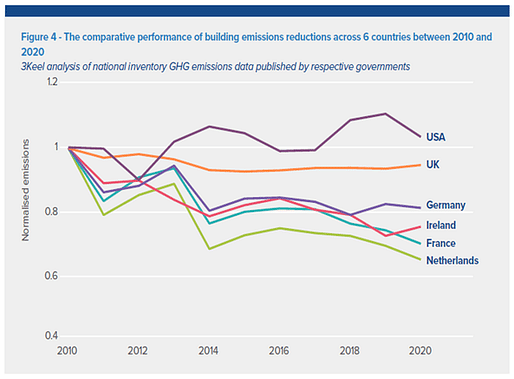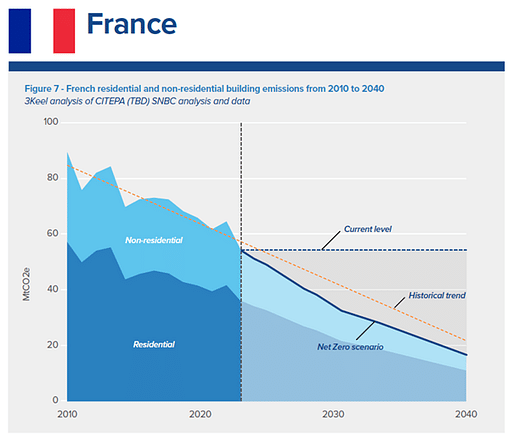
● New research by 3Keel and Kingspan finds reductions in greenhouse gas (GHG) emissions from buildings are stalling in key EU countries, plateauing in the UK and reversing in the USA
● The Global Retrofit Index report reveals in the United States, building emissions have increased by 3% since 2010 – in contrast to reductions by other G20 nations
● Over the next twenty years the US must reduce building emissions by an additional 73% to align with the country’s net zero scenario
● Without significant interventions, building emissions are expected to continue increasing towards 2050
● The study outlines sizeable barriers to retrofitting national building stocks including private investment, workforce skills shortages, and limited awareness among the general public
● The report identifies five key elements for a successful national retrofitting framework to deliver the solutions and innovations required to tackle retrofitting at scale
Reductions in carbon emissions from buildings are stalling in several G20 countries in Europe (UK, France, and Germany) and emissions are now rising in the USA, warns a major new study from sustainability consultancy 3Keel for Kingspan, Kingspan is the global leader in high-performance insulation and energy-efficient building solutions.
The Global Retrofit Index interim report – a follow on to the inaugural 2022 study - examines historical buildings emission trends and retrofitting rates to identify the gaps between current action and what is required to meet the goals of the Paris Agreement*.
The publication includes a deep dive analysis of building emissions data of some of the highest performing countries in last year’s inaugural study, with the addition of Ireland’s relatively young building stock this year as an interesting EU-based case study.
Whilst progress has been made amongst EU economies – namely, the Netherlands, France, Ireland, and Germany – the analysis finds emission reductions in these countries are now stalling, whilst the UK’s emissions are also beginning to plateau, and concerningly, in the USA, GHG emissions from buildings are increasing.

Analysis by 3Keel has revealed the reductions in building emissions over the past decade, and the additional cuts in building emissions required to align with the national net zero scenario of each country [see Table 1 below]
If each of the six countries continue with their current GHG emissions reduction trajectory and retrofitting rates over the past ten years, by 2040 these major global economies will be some distance from achieving their respective net zero pathways.
Table 1:
[See appendix A for individual country net zero scenario charts]
Furthermore, detailed analysis of Energy Performance Certificate (EPC) data shows buildings in the UK, France, and Ireland have seen relatively little improvement in the past decade with the vast majority still rated C, D or below. This means they are not energy efficient enough to deliver the decarbonization required by the Paris Agreement. Meanwhile, Germany’s residential building stock continues to be over-reliant on fossil-fuel heating.
Though retrofitting solutions already exist, the study identifies sizeable barriers preventing rapid and widespread implementation including insufficient private investment, an inadequately sized and skilled workforce, and limited awareness amongst citizens and building owners.
Despite retrofitting remaining a significant challenge, its importance in decarbonizing the built environment has never been more evident – 80 percent of the buildings that will be standing in 2050 have already been built[1].
Recognizing the barriers to decarbonization, the report also identifies five key elements that are central to delivering a successful retrofitting framework:
Each of these elements is crucial to enabling effective, affordable, and at scale retrofitting of national building stocks. Retrofitting building stocks also offers significant opportunities and benefits beyond meeting climate targets, including job creation, reductions in social inequality, and improved health and quality of living.
Report author Olwen Smith of 3Keel said,
“With over a quarter of total global emissions stemming from the operation of our buildings, retrofitting is a pivotal lever for decarbonizing the global economy. However, this study shows a concerning stagnation of progress. Our analysis of six countries with old building stocks reveals that reductions in building emissions are now stalling and retrofitting rates are lagging far behind what is required to meet net-zero goals.
The tools and technologies required to improve energy performance in buildings already exist. Coordinated efforts between governments and the private sector are now needed to overcome implementation barriers and rapidly scale retrofitting to drive down building emissions globally.”
Bianca Wong, Global Head of Sustainability at Kingspan said,
“This analysis again demonstrates the importance of retrofitting as a lever in decarbonizing the built environment if we’re to limit global warming to 1.5˚C and meet the objectives set out by the Paris Agreement.”
“With this report, we encourage policymakers and the construction industry to continue to work together to facilitate change, through innovation and regulation, to bring forward workable ideas to support retrofit solutions and reduce global building emissions.”
ENDS
* The Paris Agreement is a legally binding international treaty on climate change. It was adopted by 196 Parties at the UN Climate Change Conference (COP21) in Paris, France, on 12 December 2015. It entered into force on 4 November 2016. Its overarching goal is to hold “the increase in the global average temperature to well below 2°C above pre-industrial levels” and pursue efforts “to limit the temperature increase to 1.5°C above pre-industrial levels”.
APPENDIX A:


About 3Keel
3Keel is an award-winning Oxford-based sustainability consultancy specialising in six areas including climate change. 3Keel helps organisations at all stages of their climate change journey: from understanding their climate impact through to tracking progress against targets and communicating results.
We’re proud to have received recognition from clients and independent bodies for the work we’ve been doing, and the impact we’ve been making. We’re delighted to have received certification as a B Corp, and to have been recognised by the Financial Times as one of the UK’s Leading Management Consultants for Sustainability. We see these awards both as an honour and as motivation to continue to drive positive changes around the world. The name 3Keel comes from the keel of a boat – giving it stability in rough seas – and this is how we see our work helping to give organisations resilience in changing times."
About Kingspan
Kingspan is the global leader in high-performance insulation and energy efficient building solutions. The companies in the Kingspan Group are united by a vision of a better built environment – one that reduces carbon emissions, promotes wellbeing, and is circular by design. As the global leader in high-performance insulation and building envelope solutions, our mission is to accelerate a net zero emissions future-built environment with the well-being of people and planet at its heart. The goals in our Planet Passionate sustainability programme include net zero carbon manufacturing by 2030 and a 50 percent reduction in CO2 intensity in our primary supply chain partners, also by the end of the decade.
Kingspan Group companies are active in over 80 countries and employ in excess of 22,000 people in more than 200 manufacturing facilities. The Group is headquartered in Ireland. www.kingspan.com/group
No Comments
Block this user
Are you sure you want to block this user and hide all related comments throughout the site?
Archinect
This is your first comment on Archinect. Your comment will be visible once approved.